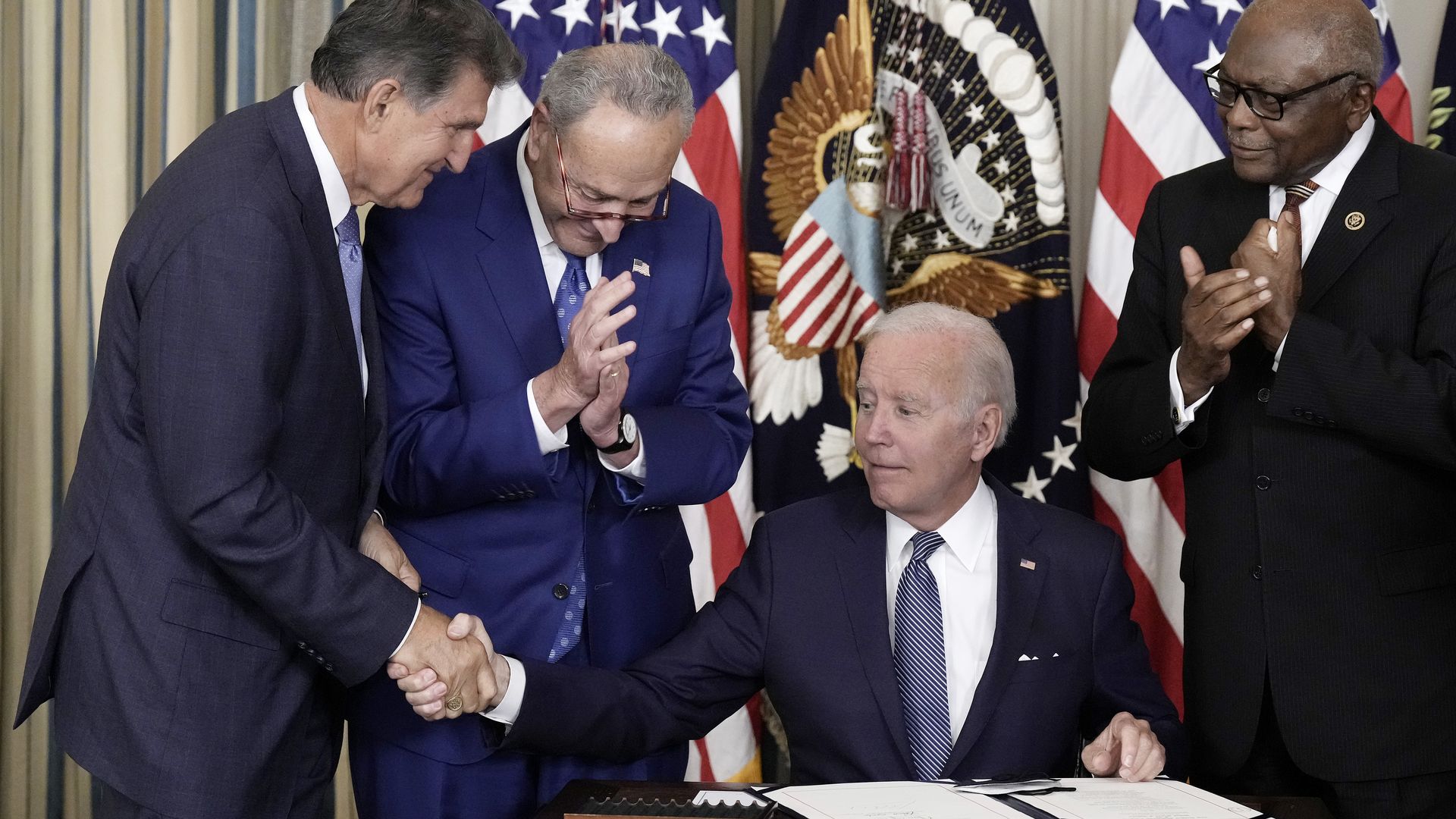Plus some NIH-funded clinical trials never report results | Wednesday, August 17, 2022
| | | | | | | | | | | Axios Vitals | | By Tina Reed · Aug 17, 2022 | | Happy mid-week, Vitals readers. Today's newsletter is 1,057 words or a 4-minute read. | | | | | | 1 big thing: Congress isn't done with messy health care fights |  | | | Illustration: Aïda Amer/Axios | | | | The Inflation Reduction Act is law. But that doesn't mean major health care interests are done testing their lobbying clout. - Many are already lining up for year-end relief from Medicare payment cuts, regulatory changes and inflation woes, Axios' Victoria Knight writes.
The big picture: Year-end spending bills often contain health care "extenders" that delay cuts to hospitals that treat the poorest patients or keep money flowing to community health centers. - But lawmakers may be hard-pressed to justify the price tag this time, and are seeing an unusual assortment of appeals for help.
Background: 2% Medicare sequester cuts that had been paused by the pandemic took effect last month. Another 4% cut could come at year's end if lawmakers don't delay it. - These automatic reductions in spending come amid health labor force shortages, supply chain problems and other pressures that are making providers jockey for relief.
- It will fall to Congress to pick winners and losers among hospitals, physicians, home health care groups, nursing homes and ambulance services. And each says the consequences of not helping are dire.
- "The core question is how do they come up with the money and how do they decide to prioritize who give it to?" said Raymond James analyst Chris Meekins.
The other side: Concerns about Medicare's solvency that emerged during the lengthy debate over the Democrats' tax, climate and health package could dampen lawmakers' enthusiasm for extensive payment fixes. - The continuation of the COVID-19 public health emergency and its myriad temporary payment allowances could also lessen a sense of urgency around provider relief.
The bottom line: For all the dire warnings, it's unlikely Congress will do much until December, when it will likely pass a continuing resolution or an omnibus spending bill and could then move to delay the 4% cut. Go deeper. |     | | | | | | 2. Who wins — or loses — with OTC hearing aids |  | | | Photo: Joe Raedle/Getty Images | | | | People with hearing loss could soon buy hearing aids without needing to have an exam, prescription or special fitting first. Driving the news: In a move years in the making, the FDA on Tuesday issued a final rule allowing over-the-counter sales of hearing aids to adults with mild or moderate hearing loss. Kids and those with serious hearing loss will still need a prescription. - They could become available as soon as October when the rule takes effect.
Who wins with this rule? - Patients with hearing loss: This change officially creates a new category of hearing aid that's expected to reach a far broader audience who may have previously avoided hearing aids due to cost and stigma. It's also expected to shake up prices and spur innovation across the market.
- Consumer electronics manufacturers: This will allow more companies to move into a space now dominated by specialty companies like ReSound, Sonova and William Demant, wrote Cowen analyst Eric Assaraf.
- Biden and the Dems: We're not trying to be cynical. But along with the health care wins in the Inflation Reduction Act, the timing of this — five years after Congress gave its blessing to the idea and less than 90 days before the midterms — just so happens to work out great for vulnerable Democrats.
Who loses? - Manufacturers/hearing care: As Republican Sen. Chuck Grassley said, this would "lower prices" for consumers and result in "more competition" — which could hurt the bottom line of incumbents. Early estimates say consumers who purchase hearing aids in this category could save $2,800 per pair.
- Patients with hearing loss: Industry groups, like the Hearing Industries Association, have backed this move with a caveat, arguing consumers who skip seeing a doctor for hearing trouble may not get timely diagnosis and treatment for more serious problems.
🎙 Listen in: Axios Today podcast host Niala Boodhoo and I discuss OTC hearing aids. |     | | | | | | 3. Some NIH-funded trials never report results |  | | | Illustration: Eniola Odetunde/Axios | | | | The National Institutes of Health did not take action against institutions and labs running government-funded clinical trials that failed to report results despite requirements to do so, Axios' Arielle Dreher writes about a report from a federal watchdog. Why it matters: Clinical trial results are crucial to pushing science forward, informing future researchers what methods or techniques might or might not work for future study design. What they found: The HHS Office of the Inspector General reviewed 72 NIH-funded clinical trials from 2019 to 2020. - Half of the trials were conducted in NIH facilities; half were conducted at external universities or research sites.
- Just 35 of these trials submitted clinical trial results on time; a dozen trials submitted results late; 25 trials never submitted results.
- NIH took "limited enforcement action" against labs and research partners who did not submit results and even continued to fund new research done by these groups, the report found.
Of note: NIH agreed with all of the recommendations from the OIG report, including making needed improvements to its reporting procedures and enforcement methods. |     | | | | | | A message from Axios | | Get your first Axios Pro newsletter tomorrow | | |  | | | | Subscribe to Axios Pro today to see everything you've been missing. How it works: Axios Pro delivers exclusive scoops and analysis, while also giving you a quick, comprehensive look at everything shaping your industry. Use code PRO200 at checkout to get $200 off your subscription. | | | | | | 4. GOP support grows for Medicaid expansion |  Note: South Dakota voters will vote on Medicaid expansion in November; Data: KFF; Chart: Axios Visuals Republican-led states that have resisted expanding Medicaid for more than a decade are showing new openness to the idea, Axios Raleigh's Lucille Sherman and Axios Atlanta's Emma Hurt report. Driving the news: In the decade-plus since the landmark Affordable Care Act was enacted, 12 states with GOP-led legislatures still have not expanded Medicaid coverage to people living below 138% of the poverty line (or nearly $19,000 annually for one person in 2022). - But there's evidence the political winds are changing in holdout states like North Carolina, Georgia, Wyoming, Alabama and Texas.
State of play: In Georgia, as first reported by Axios Atlanta, conversations about a path forward have been taking place behind the scenes in both parties. What they're saying: "There is real momentum on Medicaid expansion in these conservative states that have been holding out," said Melissa Burroughs of Families USA, a health care advocacy group working with partners in non-expansion states to push the policy. Read the rest. |     | | | | | | 5. Catch up quick |  | | | President Biden shakes hands with Sen. Joe Manchin after signing the Inflation Reduction Act. Photo: Drew Angerer/Getty Images | | | | 🍼 The Centers for Medicare and Medicaid Services approved extending Medicaid and Children's Health Insurance Program postpartum coverage for 12 months in Hawaii, Maryland and Ohio. (HHS) 🏥 Investors are scooping up failing rural hospitals for as little as $100 in exchange for their commitment to restore and keep the facilities open. (NPR) 💰 ICYMI: Drugmakers are launching new medicines at record-high prices, with the median annual price of 13 novel drugs approved for chronic conditions by FDA so far this year topping $257,000. (Reuters) |     | | | | | | A message from Axios | | Get your first Axios Pro newsletter tomorrow | | |  | | | | Subscribe to Axios Pro today to see everything you've been missing. How it works: Axios Pro delivers exclusive scoops and analysis, while also giving you a quick, comprehensive look at everything shaping your industry. Use code PRO200 at checkout to get $200 off your subscription. | | |  | | Why stop here? Let's go Pro. | | | | | | Axios thanks our partners for supporting our newsletters. If you're interested in advertising, learn more here.
Sponsorship has no influence on editorial content. Axios, 3100 Clarendon Blvd, Arlington VA 22201 | | | You received this email because you signed up for newsletters from Axios.
Change your preferences or unsubscribe here. | | | Was this email forwarded to you?
Sign up now to get Axios in your inbox. | | | | Follow Axios on social media:    | | | | | |










No comments:
Post a Comment